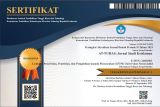Adim, ’Ali ’Abd. (1973). Al-Ma’rifah fi al-Qur’an. Matba’ah Amiriyah.
Adian, D. G. (2002). Menyoal Objektivisme Ilmu Pengetahuan: Dari David Hume sampai Thomas Kuhn. Teraju.
al-Arabiyah, M. al-Lug}ah. (1990). Al-Mu’jam al-Wasiat}. Dar al-Da’wah.
al-Bagawi, I. (1986). Ma’alimu at-Tanzil fi Tafsir wa at-Ta’wil. Daar Al-Hadhoroh.
al-Baidawi, I. (1978). Anwar at-Tanzil wa Asraru at-Tafsir. Dar al-Fikr al-Arabi.
Al-Attas, S. M. N. (1993). Islam and Secularism. ISTAC.
Amin, M. M. (1998). Epistemologi Islam. UI Press.
Amzar, S. (2001). Metode Penelitian. Pustaka Pelajar.
Asy’arie, M. (1999). Epistemologi dalam Perspektif Pemikiran Islam. LESFI.
Baqi, M. F. A. (1980). Al-Mu’jam al-Mufahras li Alfaz al-Qur`an al-Karim. Dar Al Fikri li al Taba`ah wa al-Nasyr wa al-Tauzi.
Bakker, A., & Zubair, A. C. (1990). Metodologi Penelitian Filsafat,. Kanisius.
Baringer, A. (2006). Reclaiming a Sacred Cosmology: Seyyed Hossein Nasr, the Perennial Philosophy, and Sustainability Education. Canadian Journal of Environmental Education, II(88), 26–42.
(ed), E. C. (1998). Routledge Encyclopedia of Philosophy. Taylor & Francis.
(ed), L. N. (2007). The Cambridge Companion to Locke’s: Essay Concerning Human Understanding. Cambridge University Press.
ed., R. A. (1999). The Cambridge Dictionary of Philosophy (Vol. 2nd). Cambridge University Press.
Ghusyani, M. (1999). Filsafat Sains Menurut al-Qur’an. Mizan.
Hakim, L. (2017). Integrated Learning Dalam Perspektif Pendidikan Islam. At-Turas, IV(2), 227–255. https://doi.org/10.33650/at-turas.v4i2.334
Hoesin, O. A. (1996). Filsafat Islam. Bulan Bintang.
Jalal al-Din al-Suyuti, & al-Mahalli, J. al-Din. (1987). Tafsir Jalalayn. Dar al-Fikr.
Kartanegara, M. (2003). Menyibak Tirai Kejahilan: Pengantar Epistemologi Islam. Mizan.
Kasule, U. H. (2007). Islâmiyat al-`Ulûm: At-Tibb Namûżaja. Manâhij al-`Ulûm wa Falsafatuhâ min Manzhûr Islâmî, 14–30.
Khasinah, S. (2013). Hakikat Manusia Menurut Pandangan Islam dan Barat. Jurnal Ilmiah Didaktika, XIII(02), 308–316.
Khotimah, K. (2014). Paradigma dan Konsep Ilmu Pengetahuan dalam Al-Qur’an. Episteme, IX(01), 67–84.
Lubis, A. S. (2013). Epistemologi Ilmu Dalam Al-Qur’an. Logaritma, I(01), 126–137.
Ma’arif, A. S. (1993). Peta Bumi lntelektualisme Islam di Indonesia. Mizan.
Masruri, H., & Rossidy, I. (2007). Filsafat Sains dalam Al-Qur’an: Melacak Kerangka Dasar Integrasi Ilmu dan Agama. El-Qudwah, IV(2), 1–24.
Misbahuddin, I. (2015). Epistemologi Al-Quran Dalam Membangun Sains Islam. Teologia, XXVI(01), 90–117.
Nadjamuddin, M. (2010). Konsep Ilmu dalam Al-Qur’an. Inspirasi, X(2), 165–188.
Poedjawijatna, I. R. (1997). Pembimbing ke Arah Alam Filsafat. Rineka Cipta.
Pranarka, A. M. W. (1987). Epistemologi Dasar: Suatu Pengantar. Yayasan Proklamasi Centre For Strategic nd International Studies (CSIS).
Raharjo, M. D. (1990). Ensiklopedi Al Qur`an. Ulumul Qur`an, 1(4).
Rahman, F. (1988). Islamization of Knowledge: A Respond. The American Journal of Islamic and Social Science, V(01).
Salim, Abd. M. (2004). Al-Qur’an sebagai Sumber Ilmu Pengetahuan. Jurnal Mitra, I(01), 14.
Santoso, M. A. F. (2016). Rekonstruksi Epistemologi Keilmuan Islam: Tinjauan Sumber, Tujuan, Dan Metode Keilmuan. International Conference On Islamic Epistemology, II, 1–12.
Shihab, M. Q. (1996). Wawasan al-Qur’an: Tafsir Maudu’i atas Pelbagai Persoalan Umat. Mizan.
Shihab, M. Q. (1997). Tafsir Al-Qur’an al Karim: Tafsir atas Surat-surat Pendek Berdasarkan Urutan Turunnya Wahyu. Mizan.
Syafe’i, I. (2000). Konsep Ilmu Pengetahuan dalam al-Qur’an. UII Press.
Tafsir, A. (2001). Filsafat Umum. Remaja Rosda Karya.
Ummah, S. R. (2017). Relevansi Perintah Iqra’ Pada Wahyu Pertama Pada Masyarakat Modern. Pancawahana: Jurnal Studi Islam, XII(01).
Zed, M. (2004). Metode Penelitian Kepustakaan. Yayasan Obor Indonesia.
 (UIN Maulana Malik Ibrahim, Malang)
(UIN Maulana Malik Ibrahim, Malang) 




.png)






